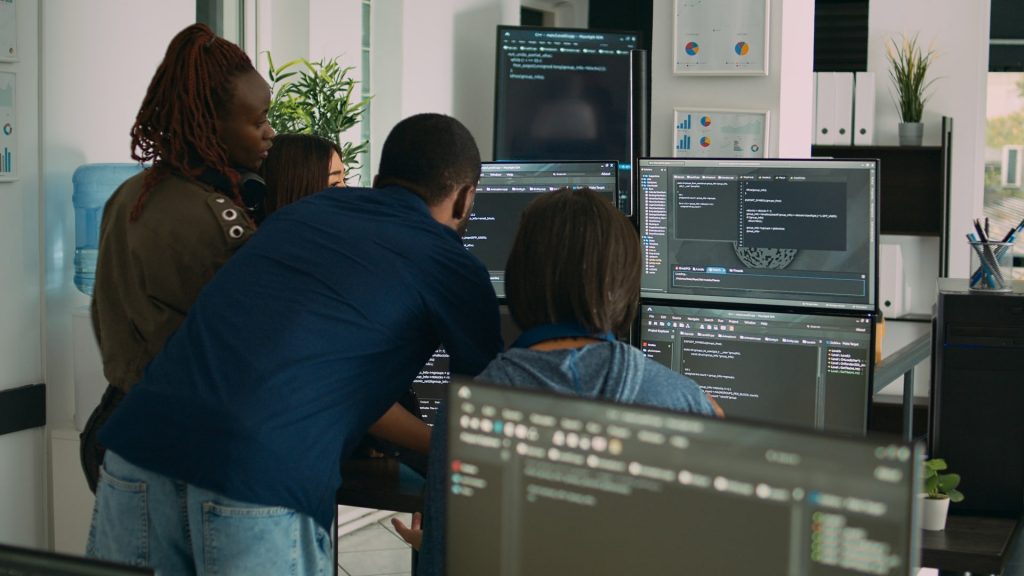
Robohub.org
Why diversity and inclusion needs to be at the forefront of future AI

Image: shutterstock.com
By Inês Hipólito/Deborah Pirchner, Frontiers science writer
Inês Hipólito is a highly accomplished researcher, recognized for her work in esteemed journals and contributions as a co-editor. She has received research awards including the prestigious Talent Grant from the University of Amsterdam in 2021. After her PhD, she held positions at the Berlin School of Mind and Brain and Humboldt-Universität zu Berlin. Currently, she is a permanent lecturer of the philosophy of AI at Macquarie University, focusing on cognitive development and the interplay between augmented cognition (AI) and the sociocultural environment.
Inês co-leads a consortium project on ‘Exploring and Designing Urban Density. Neurourbanism as a Novel Approach in Global Health,’ funded by the Berlin University Alliance. She also serves as an ethicist of AI at Verses.
Beyond her research, she co-founded and serves as vice-president of the International Society for the Philosophy of the Sciences of the Mind. Inês is the host of the thought-provoking podcast ‘The PhilospHER’s Way’ and has actively contributed to the Women in Philosophy Committee and the Committee in Diversity and Inclusivity at the Australasian Association of Philosophy from 2017 to 2020.
As part of our Frontier Scientist series, Hipólito caught up with Frontiers to tell us about her career and research.

Image: Inês Hipólito
What inspired you to become a researcher?
Throughout my personal journey, my innate curiosity and passion for understanding our experience of the world have been the driving forces in my life. Interacting with inspiring teachers and mentors during my education further fueled my motivation to explore the possibilities of objective understanding. This led me to pursue a multidisciplinary path in philosophy and neuroscience, embracing the original intent of cognitive science for interdisciplinary collaboration. I believe that by bridging disciplinary gaps, we can gain an understanding of the human mind and its interaction with the world. This integrative approach enables me to contribute to both scientific knowledge and real-world applications benefitting individuals and society as a whole.
Can you tell us about the research you’re currently working on?
My research centers around cognitive development and its implications in the cognitive science of AI. Sociocultural contexts play a pivotal role in shaping cognitive development, ranging from fundamental cognitive processes to more advanced, semantically sophisticated cognitive activities that we acquire and engage with.
As our world becomes increasingly permeated by AI, my research focuses on two main aspects. Firstly, I investigate how smart environments such as online spaces, virtual reality, and digitalized citizenship influence context-dependent cognitive development. By exploring the impact of these environments, I aim to gain insights into how cognition is shaped and adapted within these technologically mediated contexts.
Secondly, I examine how AI design emerges from specific sociocultural settings. Rather than merely reflecting society, AI design embodies societal values and aspirations. I explore the intricate relationship between AI and its sociocultural origins to understand how technology can both shape and be influenced by the context in which it is developed.
In your opinion, why is your research important?
The aim of my work is to contribute to the understanding of the complex relationship between cognition and AI, focusing on the sociocultural dynamics that influence both cognitive development and the design of artificial intelligence systems. I am particularly interested in understanding and the paradoxical nature of AI development and its societal impact: while technology historically improved lives, AI has also brought attention to problematic biases and segregation highlighted in feminist technoscience literature.
As AI progresses, it is crucial to ensure that advancements benefit everyone and do not perpetuate historical inequalities. Inclusivity and equality should be prioritized, challenging dominant narratives that favor certain groups, particularly white males. Recognizing that AI technologies embody our implicit biases and reflect our attitudes towards diversity and our relationship with the natural world enables us to navigate the ethical and societal implications of AI more effectively.
Are there any common misconceptions about this area of research? How would you address them?
The common misconception of viewing the mind as a computer has significant implications for AI design and our understanding of cognition. When cognition is seen as a simple input-output process in the brain, it overlooks the embodied complexities of human experience and the biases embedded in AI design. This reductionist view fails to account for the importance of embodied interaction, cognitive development, mental health, well-being, and societal equity.
This subjective experience of the world cannot be reduced to mere information processing, as it is context-dependent and imbued with meanings partly constructed in societal power dynamics.
Because the environment is ever more AI-permeated, understanding how it is shaped by and shapes the human experience requires investigation beyond the conceiving of cognition as (meaningless) information processes. By recognizing the distributed and embodied nature of cognition, we can ensure that AI technologies are designed and integrated in a way that respects the complexities of human experience, embraces ambiguity, and promotes meaningful and equitable societal interactions.
What are some of the areas of research you’d like to see tackled in the years ahead?
In the years ahead, it is crucial to tackle several AI-related areas to shape a more inclusive and sustainable future:
Design AI to reduce bias and discrimination, ensuring equal opportunities for individuals from diverse backgrounds.
Make AI systems transparent and explainable, enabling people to understand how decisions are made and how to hold them accountable for unintended consequences.
Collaborate with diverse stakeholders to address biases, cultural sensitivities, and challenges faced by marginalized communities in AI development.
Consider the ecological impact, resource consumption, waste generation, and carbon footprint throughout the entire lifecycle of AI technologies.
How has open science benefited the reach and impact of your research?
Scientific knowledge that is publicly funded should be made freely available to align with the principles of open science. Open science emphasizes transparency, collaboration, and accessibility in scientific research and knowledge dissemination. By openly sharing AI-related knowledge, including code, data, and algorithms, we encourage diverse stakeholders to contribute their expertise, identify potential biases, and address ethical concerns within technoscience.
Furthermore, incorporating philosophical reasoning into the development of the philosophy of mind theory can inform ethical deliberation and decision-making in AI design and implementation by researchers and policymakers. This transparent and collaborative approach enables critical assessment and improvement of AI technologies to ensure fairness, diminishing of bias, and overall equity.
This article is republished from Frontiers in Robotics and AI blog. You can read the original article here.



